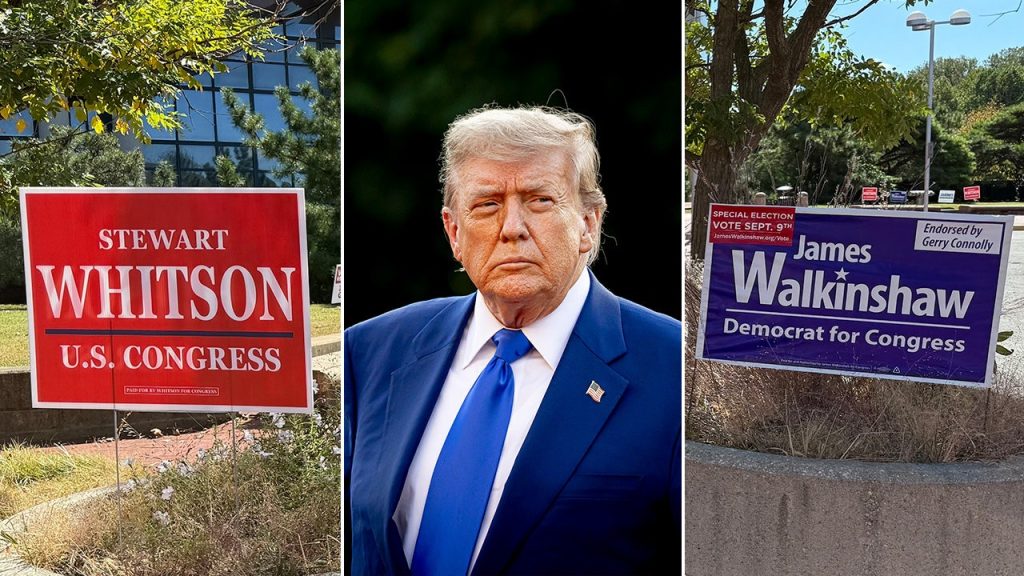Trump Looms Large in Virginia’s Special Congressional Election
In Northern Virginia’s 11th Congressional District, a special election has emerged as a microcosm of national politics, with former President Donald Trump’s influence and policies taking center stage despite his absence from the ballot. Democratic nominee James Walkinshaw and Republican Stewart Whitson are vying to fill the seat of the late Representative Gerry Connolly, who died in June after battling cancer. The election’s outcome could further narrow the GOP’s already slim House majority, currently standing at 219-212, making this contest particularly significant for both parties.
The district, home to tens of thousands of federal workers and contractors, has been directly impacted by job cuts implemented through Trump’s Department of Government Efficiency (DOGE). “Folks in Northern Virginia and Fairfax are feeling the impact of the Trump policies,” Walkinshaw noted on the eve of the election. “We’re kind of on the leading edge of the Trump economy here. Everybody in Fairfax knows someone, probably someone on their street, maybe the parent of their kid’s soccer team, who has lost their job because of DOGE.” Walkinshaw, who previously served as Connolly’s chief of staff and is currently a Fairfax County Board of Supervisors member, suggests that voters will use this election to send a message about these policies. Whitson, however, frames the issue differently, arguing that affected workers “don’t need empathy. They need solutions.” The Republican candidate, an Army veteran and former FBI special agent, believes that Walkinshaw’s promise to “fight President Trump” won’t improve the situation and instead advocates for someone who can “work with any administration, whether it’s Republican or Democrat.”
Beyond federal employment concerns, cultural issues have become flashpoints in the campaign, particularly transgender policies in Fairfax County schools. Whitson has been vocal in his opposition to policies allowing transgender students to use bathrooms aligned with their gender identity. “My opponent believes it is a civil right for men who identify as girls or women to go into our girls’ locker rooms and watch them change,” Whitson charged. “I think this is all backwards. I think it is a civil right for girls and women when they see a female sign on a bathroom that they know they can go in there and be safe.” Walkinshaw has countered by suggesting his opponent is “obsessed with how maybe 1% of the kids in our schools use the bathrooms,” while he focuses on “how 100% of our kids can succeed in the classrooms.” This debate reflects broader national tensions over transgender rights and education policy that have become central to Republican messaging.
The campaign has also featured attempts to paint opponents with broad political brushes. Whitson has tried to link Walkinshaw to Zohran Mamdani, the democratic socialist who won New York City’s Democratic mayoral nomination, claiming Walkinshaw supports “a lot of the exact same type of policies.” Walkinshaw dismisses this comparison, stating that “not a single voter has asked me about the New York mayor’s election” and that he’s focused solely on the 11th District. Meanwhile, despite Trump’s unpopularity in the district—where he won just 31% of the vote in 2024—Whitson maintains that Trump’s policies “center on common sense” and argues that “the radical left has just pushed so far away from common sense” on issues ranging from education to crime policy.
Surprisingly, both candidates have addressed the ongoing calls for the Justice Department to release files related to Jeffrey Epstein, the convicted sex offender who died in prison in 2019. Walkinshaw says this issue resonates “across the political spectrum” and has committed to signing a bipartisan discharge petition urging the release of these files if elected. “I think the American people deserve to know. I want to know what the Trump administration, if anything, is covering up,” he stated. Whitson counters that he called for disclosure “months ago” and accuses Walkinshaw of being “late to the game” and using the issue for “political gain” rather than genuine concern for victims.
The special election represents more than just a local contest—it’s a bellwether for how voters might respond to Trump’s agenda in areas directly affected by his policies. For Democrats, a victory would not only narrow Republicans’ House majority but also signal disapproval of Trump’s approach to federal employment and social issues. For Republicans, winning in a district they haven’t held in nearly two decades would suggest their messages on crime, immigration, and traditional values are resonating even in Democratic-leaning areas. As voters cast their ballots, they’re not just selecting a representative but potentially sending a message about the direction of national politics that could have implications far beyond Northern Virginia’s suburbs.


